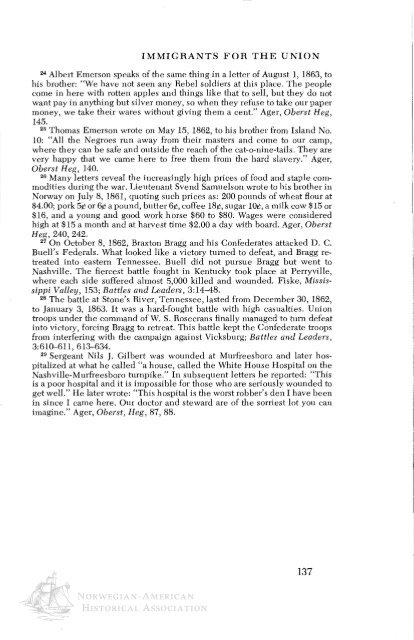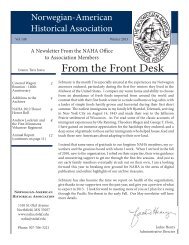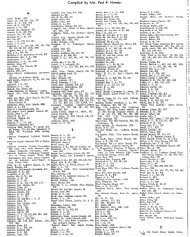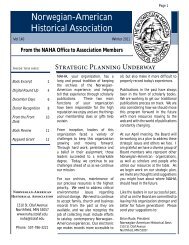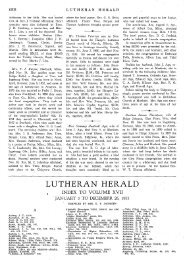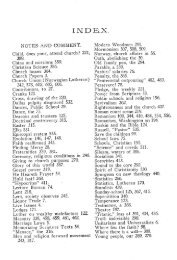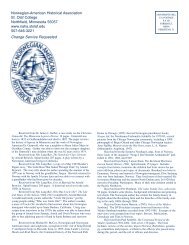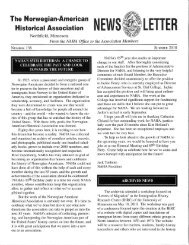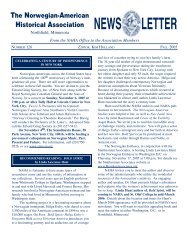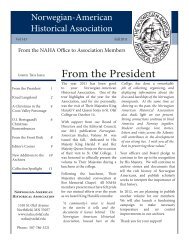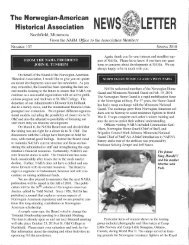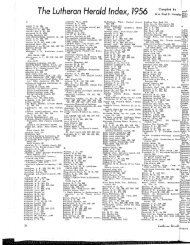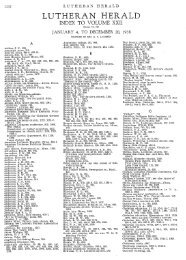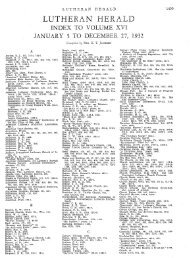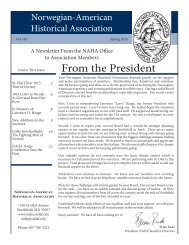Two Immigrants for the Union.' Their Civil War Letters - Norwegian ...
Two Immigrants for the Union.' Their Civil War Letters - Norwegian ...
Two Immigrants for the Union.' Their Civil War Letters - Norwegian ...
You also want an ePaper? Increase the reach of your titles
YUMPU automatically turns print PDFs into web optimized ePapers that Google loves.
IMMIGRANTS FOR THE UNION<br />
24<br />
Albert Emerson speaks of <strong>the</strong> same thing in a letter of August l, 1863, to<br />
his bro<strong>the</strong>r: "We have not seen any Rebel soldiers at this place. The people<br />
come in here with rotten apples and things like that to seil, but <strong>the</strong>y do not<br />
want pay in anything but silver money, so when <strong>the</strong>y refuse to take our paper<br />
money, we take <strong>the</strong>ir wares without giving <strong>the</strong>m a cent." Ager, Oberst Heg,<br />
145.<br />
25<br />
Thomas Emerson wrote on May 15, 1862, to his bro<strong>the</strong>r from Island No.<br />
10: "All <strong>the</strong> Negroes run away from <strong>the</strong>ir masters and come to our camp,<br />
where <strong>the</strong> y can be safe and outside <strong>the</strong> reach of <strong>the</strong> cat-o-nine-tails. They are<br />
very happy that we came here to free <strong>the</strong>m from <strong>the</strong> hard slavery." Ager,<br />
Oberst H eg, 140.<br />
26<br />
Man y letters reveal <strong>the</strong> increasingly high prices of food and staple commodities<br />
during <strong>the</strong> war. Lieutenant Svend Samuelson wrote to his bro<strong>the</strong>r in<br />
Norway on July 8, 1861, quoting such prices as: 200 pounds of wheat flour at<br />
$4.00; park 5ø or 6Ø apound, butter 6Ø, coffee 18Ø, sugar lOØ, a milk cow $15 or<br />
$16, and a young and good work horse $60 to $80. Wages were considered<br />
high at $15 a month and at harvest time $2.00 a day with board. Ager, Oberst<br />
Heg, 240, 242.<br />
27<br />
On October 8, 1862, Braxton Bragg and his Confederates attacked D. C.<br />
Buell's Federals. What looked like a victory turned to defeat, and Bragg retreated<br />
into eastern Tennessee. Bue!! did not pursue Bragg but went to<br />
Nashville. The fiercest battle fought in Kentucky took place at Perryville,<br />
where each side suffered almost 5,000 killed and wounded. Fiske, Mississippi<br />
Valley, 153; Battles and Leaders, 3:14-48.<br />
28<br />
The battle at Stone's River, Tennessee, lasted from December 30, 1862,<br />
to January 3, 1863. It was a hard-fought battle with high casualties. <strong>Union</strong><br />
troops under <strong>the</strong> command of W. S. Rosecrans finally managed to turn defeat<br />
into victory, <strong>for</strong>cing Bragg to retreat. This battle kept <strong>the</strong> Confederate troops<br />
from interfering with <strong>the</strong> campaign against Vicksburg; Battles and Leaders,<br />
3:610-611, 613-634.<br />
29<br />
Sergeant Nils J. Gilbert was wounded at Murfreesboro and later hospitalized<br />
at what he called "a house, called <strong>the</strong> White House Hospital on <strong>the</strong><br />
Nashville-Murfreesboro turnpike," In subsequent letters he reported: "This<br />
is a poor hospital and it is impossible <strong>for</strong> those who are seriously wounded to<br />
get well." He later wrote: "This hospital is <strong>the</strong> worst robber's den I have been<br />
in since I came here. Our doctor and steward are of <strong>the</strong> sorriest lot you can<br />
imagine." Ager, Oberst, Heg, 87, 88.<br />
137


